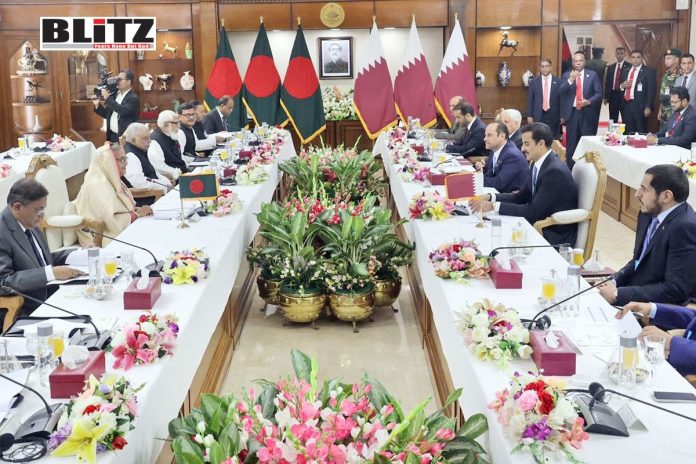In a significant development that could bolster economic ties between Bangladesh and Qatar, Prime Minister’s Private Industry and Investment Adviser Salman F Rahman has revealed Qatar’s keenness to sign a Free Trade Agreement (FTA) with Bangladesh. This announcement comes after a bilateral meeting held between the two nations at a hotel in the city on Monday evening.
During the meeting, Salman F Rahman led the Bangladesh delegation, while Minister of Commerce and Industry of Qatar, Sheikh Mohmmed bin Hamad Al Thani, represented the Qatari side. The discussions, according to Rahman, were productive and promising, laying the groundwork for future collaborations in various sectors.
Qatar’s interest in an FTA with Bangladesh signifies its eagerness to strengthen economic relations and tap into Bangladesh’s potential as a trading partner. Salman F Rahman noted that the Qatari delegation showed significant interest in the proposal, highlighting their existing FTAs with several countries around the world, including a recent one with South Korea.
“The Qatari delegation expressed their interest in FTA when the proposal was placed in the meeting. They have shown great interest in this proposal. They said they have FTA with many countries of the world. Recently they signed an FTA with South Korea,” Salman F Rahman stated.
Furthermore, the Qatari side also expressed interest in discussions with Bangladesh regarding commodity exchange and Sukuk investment. This demonstrates Qatar’s willingness to explore diverse investment opportunities in Bangladesh, potentially leading to increased trade and economic growth for both countries.
One of the key areas of interest identified during the meeting was food products. Qatar, being a significant importer of food products, presents a lucrative market for Bangladesh’s agricultural and food exports. Salman F Rahman mentioned Bangladesh’s interest in exporting various food products, including meat, to Qatar, indicating a potential avenue for Bangladesh to diversify its export portfolio and enhance its trade balance.
“The governments of the two countries will work for the development of business and trade in these areas by creating a favourable environment,” Salman F Rahman added.
In addition to government-level discussions, the private sector’s role was also emphasized during the meeting. Federation of Bangladesh Chamber of Commerce and Industry (FBCCI) President Mahbubul Alam expressed interest in leading a delegation to Qatar to foster better relations between businessmen from both countries. This initiative was warmly welcomed by the president of the Chamber in Qatar, reflecting the private sector’s enthusiasm for strengthening bilateral trade and investment ties.
“The meeting decided to work for the development of the private sector of the two countries,” Salman F Rahman stated, underscoring the importance of public-private partnerships in driving economic growth and creating a conducive environment for business and trade.
The meeting was also attended by State Minister for Commerce Ahsanul Islam Titu, FBCCI President Mahbubul Alam, and several senior government officials, highlighting the government’s commitment to promoting bilateral cooperation and facilitating discussions on key economic issues.
As Bangladesh and Qatar look forward to exploring new avenues of collaboration, the potential signing of an FTA could serve as a catalyst for enhancing trade relations, encouraging investments, and fostering economic development. With both countries expressing mutual interest in strengthening ties across various sectors, the future holds promising prospects for a robust and mutually beneficial partnership.
Qatar’s keen interest in signing an FTA with Bangladesh marks a significant step towards deepening economic relations and unlocking new opportunities for trade and investment. As both countries work towards realizing their shared goals of economic growth and prosperity, collaboration, and cooperation will undoubtedly play pivotal roles in shaping their future relations.




